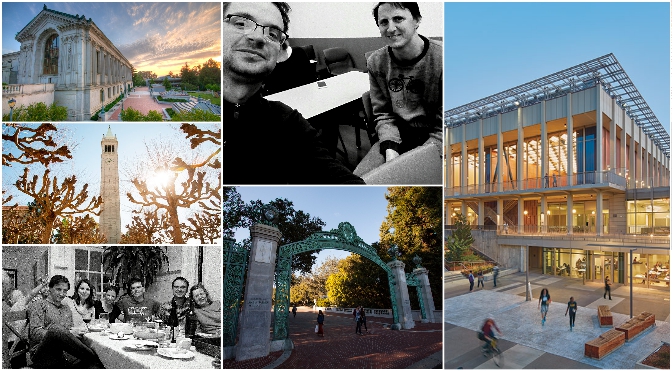It does not happen so often that we have several researchers on a visit, not only in the same country, but more precisely at the same institution. That is why we decided to mark this special occasion with a joint interview. Filip Matejka and Filip Pertold (and Michal Bauer) went to the University of California, Berkeley. While we miss them greatly, we realize that today’s loss is a future gain: we hope they return not just safe and sound, but also satisfied, refreshed, and inspired.
Long journeys bring an opportunity to cut oneself off from the disturbing nature of the everyday routine and go back to what you actually want, what really matters to you. Does it work for your research visits?
FM: Yes, it works 100%. It’s beautiful. It’s very useful to get away from routine worrying about the home institution, too. It does just as well without me :). And now that Filip and Michal have arrived, I’ll be hiding away from them as much as possible. Of course, except for the joint project with Michal, joint lunches, Wed and Fri evening beers, and occasional play dates.
FP: Sure, I think one needs to do it once in a while to get a broader picture of what one actually is doing. It also helps to get new and fresh research ideas, to find out how policies work elsewhere and what results they bring to society.
This is not the first time that you went on a long-term research visit abroad. Where does it stand among the others?
FM: This is probably the best one. My family is enjoying it more, which allows me to have fun and do good work as well. It’s a great place for academics and also for life. The economics department is obviously great, the people in the area are nice and relaxed, and there are lots of places to visit.
FP: Berkeley is really a special place, which has a very liberal atmosphere. It is so different from my Chicago visit during my PhD studies.
What are you working on there, actually?
FM: I’m finishing some of my old papers (the same old story of rational inattention). For this it’s great to be away – but I’m also talking a lot to the local faculty, and trying to explore new directions. There are other empirical economists at Berkeley who are interested in what I do.
FP: Several projects: I’m trying to finish my older topics (sick leave and how women are sorted into different employment sectors). At the same time I plan to consult with local scholars concerning my project on how social norms affect the division of household production between men and women.
Do you have a chance to meet with new researchers from your field, or is it just “the old bunch”?
FM: Yes, for sure. I’m trying to take advantage of the new crowd. That was one of the reasons why I chose Berkeley – most of the people I know and often interact with are on the east coast. I would like to emphasize this: sometimes I feel our students don’t take full advantage of some of the great mobility stays that they go on. Here, I go to four seminars a week, meet for lunches with people, and talk about research as much as I can. Once I’m back home, I’ll talk again to my colleagues, but obviously when I have a chance to talk to someone for the first time, there is an opportunity to learn something new.
FP: All the people here are new for me.
What is the most interesting thing that you have come across since the beginning of your stay?
FM: Whales and surfing in Hawaii.
FP: I am impressed by how liberal Berkeley is. It is so relaxed and one can feel it everywhere here.
If you could bring back home one feature of the academic environment in the US, what would it be?
FM: I don’t think I’ll come up with anything deep: size or quality. On the faculty side, obviously, a few potential Nobel Prize winners, but that’s unlikely. We’re doing well anyway…perhaps cohesion, joint faculty lunches. And size matters, as to how many faculty and students attend seminars, etc. However, let me emphasize the nice and reassuring thing is that it’s not a completely different world. We are a department that works almost the same: the seminars look almost the same, faculty talk about almost the same things – just everything is somewhat better at Berkeley. Maybe one thing is more different: excitement. Faculty as well as students here at UC B seem to be working on problems that they are deeply interested in; they are the most curious students of their own research question. Of course, I’m talking about on average, not about each individual.
FP: Open-mindedness. An informal atmosphere and very structured thinking.
What would the biggest satisfaction be when you return to CERGE-EI?
FM: I wanted to say a red carpet rolled out, but we already have that at CERGE-EI. Perhaps, I’d like to keep the big perspective. I used to be a pretty relaxed guy. I don’t know what changed, but coming here in August, I wasn’t as much anymore. Taking a sabbatical is good for reflecting on what’s important; it’s a chance for a restart. If in June you see me grumpy and worried with my petty problems, then I wasted the time off.
FP: If I bring some inspirational thinking with me and new topics to work on.
